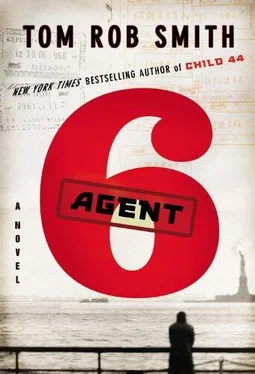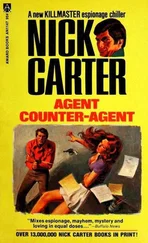Tom Smith - Agent 6
Здесь есть возможность читать онлайн «Tom Smith - Agent 6» весь текст электронной книги совершенно бесплатно (целиком полную версию без сокращений). В некоторых случаях можно слушать аудио, скачать через торрент в формате fb2 и присутствует краткое содержание. Жанр: Триллер, на английском языке. Описание произведения, (предисловие) а так же отзывы посетителей доступны на портале библиотеки ЛибКат.
- Название:Agent 6
- Автор:
- Жанр:
- Год:неизвестен
- ISBN:нет данных
- Рейтинг книги:4 / 5. Голосов: 1
-
Избранное:Добавить в избранное
- Отзывы:
-
Ваша оценка:
- 80
- 1
- 2
- 3
- 4
- 5
Agent 6: краткое содержание, описание и аннотация
Предлагаем к чтению аннотацию, описание, краткое содержание или предисловие (зависит от того, что написал сам автор книги «Agent 6»). Если вы не нашли необходимую информацию о книге — напишите в комментариях, мы постараемся отыскать её.
Agent 6 — читать онлайн бесплатно полную книгу (весь текст) целиком
Ниже представлен текст книги, разбитый по страницам. Система сохранения места последней прочитанной страницы, позволяет с удобством читать онлайн бесплатно книгу «Agent 6», без необходимости каждый раз заново искать на чём Вы остановились. Поставьте закладку, и сможете в любой момент перейти на страницу, на которой закончили чтение.
Интервал:
Закладка:
The first explosion was so powerful Zabi was punched out of the tree, a force hitting her in the chest, knocking her backwards. She fell, branches breaking beneath her. She would’ve hit the ground but Sayed caught her. There was intense heat from a fire. A plume of smoke mushroomed above them, rising up into the sky, an angry spirit unleashed. The orchards nearest the village were ablaze, the tops of trees burning. A second explosion, a rush of air, its heat curling her eyelashes. Sayed reacted, he ran, carrying her under his arm like a rolled-up rug. Clods of earth thumped down around them.
Looking back, she saw black smoke ballooning through the trees, rolling towards them like the edge of an evil cloud. Suddenly the cloud broke apart – a flock of mountain ponies burst through the smoke. Their eyes were huge, their manes on fire, skin blackened and burnt. Some were blind, or blind with panic, crashing head-on with the narrow trunks of the apricot trees, the trees splintering, the ponies dropping to the ground. Their hooves ripped up the soil. One pony continued to run even with its stomach gashed open, charging past, while another collapsed to the ground beside them, legs buckling underneath it, tongue hanging out.
The mechanical thumping noise returned. One of the flying machines pushed through the black cloud, hovering directly overhead. Sayed ran faster, his eyes wild with same panic as the ponies crashing about them on either side. There was nowhere to hide.
Zabi saw the irrigation channel ahead. Before they could reach it, a third explosion – the ground collapsing and giving way, every clod of soil, every leaf vibrating. Sayed threw her forward. For a moment she was in the air, then crashing down, landing in the channel, smashing through the surface, submerged beneath the freezing current. She rolled over, looking up through the water. There was no sign of Sayed. A burning pony leaped overhead, hooves clipping the concrete walls. The blue sky disappeared, replaced by fire. The freezing water began to bubble and boil.
Greater Province of Kabul City of Kabul Jada-e-Maiwand District Microrayon Apartment Complex
The apartment was newly constructed, government-created accommodation. The interior smelled of fresh paint and glue. Leo tried to open the window but it had been bolted shut, perhaps for his security since the Soviet-made glass was shatterproof, each pane costing more to import than an Afghan glassblower earned in a year. He rested against the window, watching as the sunset refracted through dense city smog, transforming a layer of dirt and dust into patterns of red and orange light. He was on the fifth floor, the top floor of what would be, were it situated in the outskirts of Moscow, an anonymous concrete block of apartments unworthy of a second look. But in Kabul the building’s blandness was notable, a foreign anomaly based on Soviet designs entirely unlike the traditional stucco buildings. Built at breakneck speed, using none of the local trades or traditional craftsmanship, these apartment blocks had sprung up across the Jada-e-Maiwand district after the invasion as if from spores. This particular building, finished only last week, had a barbed-wire perimeter fence with security spotlights and was patrolled by Soviet soldiers, not Afghans, a measure of the mistrust between the two forces. Fearing further reprisals after the brutal public spectacle of Dost Mohammad’s death, Soviet personnel, including advisers, had been moved into secure compounds. Leo’s protests had been overruled. There were to be no exceptions. In a matter of hours they’d created an occupation-force ghetto, exactly the legacy of division and suspicion that Dost Mohammad wanted to leave behind.
Upon moving in Leo had immediately unscrewed the four doors between the rooms, stacking them on the floor. With the doors removed, there was an area in the living room where he could see the entire apartment, could confirm that the rooms were empty, preventing his imagination from tormenting him with the memories of his family. Even so, this layout was far too close to the home he’d shared with Raisa and the girls, a duplication of a typical Soviet apartment, ready furnished with plywood bookcases and wardrobes. Leo had nothing to unpack. All his possessions were on the coffee table, the bundle of unfinished letters to his daughters and his opium pipe. He’d decided not to collect the letters he’d received from Elena and Zoya for the sole reason that he couldn’t stop reading them – he’d comb through the contents repeatedly until the words and sentences broke down, no longer making sense. With each reading his uncertainty regarding their true meaning grew, forcing him to read them once more, creating an obsessive cycle. He’d cross-reference letters, wondering why Zoya had only written eight hundred words this time when normally she wrote over a thousand, or wondering if Elena’s style had become colder towards him, whether her final remark – With love – was written sincerely or out of a sense of reluctant duty. It was impossible to be sure of the tone. On one hot summer’s night he’d read a single, one-page letter from Elena, with her neat small handwriting, several hundred times, and would have read it several hundred more times if the opium hadn’t sent him to sleep. After that, he’d taken to reading a letter no more than three times before burning it, but he had not received a new letter for several months now. The absence of communication might be down to the unreliable nature of delivery – a stack of three or four could arrive together – but more likely it was because he hadn’t responded to the last one. He found it increasingly difficult to compose his thoughts, frustratedcross-refeis attempts, starting a hundred times and hating everything he said.
Pacing the coarse synthetic fitted carpet, an aberration in this country since carpets filled with dirt and dust in days, Leo needed to smoke as a matter of urgency. As he prepared his stash, faint music could be heard from the adjacent apartment, coming from his new neighbour: Nara Mir.
After the attempted arrest of Dost Mohammad, Leo had accompanied his only surviving student back to her family home to help collect her belongings, the most important of which – her books on Marxism – had been hidden outside in the failed hope that her parents wouldn’t find them. Two Soviet soldiers provided protection. By the time they were ready to leave a crowd had gathered, pushing up to the edge of the vehicle. The soldiers fired shots into the air to disperse the mob while Leo bundled Nara into the car. As they drove through the crowd, a small plastic bag hit the windscreen. Acid leaked out and the glass smoked and melted. Leo ordered the soldiers to continue driving, not to get out of the car, sensing that the provocation was a prelude to an ambush. Nara remained calm, despised by the community she’d once been part of. In response to her exile, she practised her Russian.
– My Russian is not good. I would like to make it better. From now we must speak more Russian.
For the rest of the journey, as the windscreen bubbled and hissed, she read her Russian phrase book as though nothing were wrong.
Curious at the sound of this music, Leo found the discipline to delay smoking, slipping on his flip-flops. He entered the corridor and knocked on her door. Nara opened up, releasing the several heavy locks. She was wearing her uniform despite being off duty. She’d been granted the privilege of Soviet-level accommodation primarily because she was an important symbol of the insurgents’ failure to kill all the trainee officers, rather than a gesture of equality between the two forces. She was a talisman of the occupation, and they intended to protect her. Outside the barbed-wire fence and guard patrols she would only last a few hours.
Читать дальшеИнтервал:
Закладка:
Похожие книги на «Agent 6»
Представляем Вашему вниманию похожие книги на «Agent 6» списком для выбора. Мы отобрали схожую по названию и смыслу литературу в надежде предоставить читателям больше вариантов отыскать новые, интересные, ещё непрочитанные произведения.
Обсуждение, отзывы о книге «Agent 6» и просто собственные мнения читателей. Оставьте ваши комментарии, напишите, что Вы думаете о произведении, его смысле или главных героях. Укажите что конкретно понравилось, а что нет, и почему Вы так считаете.












